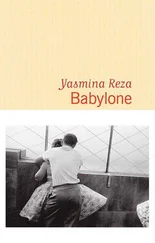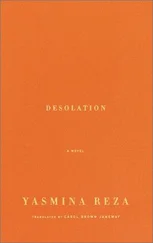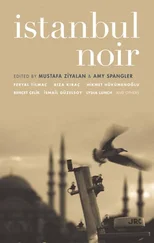Yasmina Reza - Adam Haberberg
Здесь есть возможность читать онлайн «Yasmina Reza - Adam Haberberg» весь текст электронной книги совершенно бесплатно (целиком полную версию без сокращений). В некоторых случаях можно слушать аудио, скачать через торрент в формате fb2 и присутствует краткое содержание. Год выпуска: 2007, Издательство: Knopf, Жанр: Современная проза, на английском языке. Описание произведения, (предисловие) а так же отзывы посетителей доступны на портале библиотеки ЛибКат.
- Название:Adam Haberberg
- Автор:
- Издательство:Knopf
- Жанр:
- Год:2007
- ISBN:нет данных
- Рейтинг книги:3 / 5. Голосов: 1
-
Избранное:Добавить в избранное
- Отзывы:
-
Ваша оценка:
- 60
- 1
- 2
- 3
- 4
- 5
Adam Haberberg: краткое содержание, описание и аннотация
Предлагаем к чтению аннотацию, описание, краткое содержание или предисловие (зависит от того, что написал сам автор книги «Adam Haberberg»). Если вы не нашли необходимую информацию о книге — напишите в комментариях, мы постараемся отыскать её.
, revels in the tragicomedy of one man’s midlife crisis.
While slumped on a park bench in Paris, a man is suddenly hailed by an old female classmate whom he has not seen since high school. The poor guy is, of course, a writer. Morose, panicked about his health, preoccupied with his marriage miseries and the fiasco of his recent book launch, he finds himself stranded in the desert of male middle age. And now there’s the strange business of this woman, who may or may not still be in love with him. Somehow he finds himself riding in her Jeep, riding to her place, not for any of the sensational reasons you might imagine, but because he sort of got stuck in a conversation without any chance of escape. Now he has to find his way out — and home.
A bitingly funny, lethally wise portrait of a hapless nonhero’s big adventure.
Adam Haberberg — читать онлайн бесплатно полную книгу (весь текст) целиком
Ниже представлен текст книги, разбитый по страницам. Система сохранения места последней прочитанной страницы, позволяет с удобством читать онлайн бесплатно книгу «Adam Haberberg», без необходимости каждый раз заново искать на чём Вы остановились. Поставьте закладку, и сможете в любой момент перейти на страницу, на которой закончили чтение.
Интервал:
Закладка:
“I even have a picture of the two of you,” says Marie-Thérèse, “a school photo taken in the eleventh grade, I think.”
Of course she's kept all the class photos, he tells himself. The same set of class photos his mother always kept, the way she kept his teeth, blackened with age, in a metal box. Those class photos in which he invariably appears sad and ugly, sadder and uglier he used to think, with every passing year. While each time the others looked better in those photos, there was always something dubious about me, he told himself, the phony smile, the badly parted hair, something phony about my posture. Not one of those class photos was any good, he thinks, and my mother kept them all, every year approving of my freakish appearance, uncritically approving of her boy's progress from grade to grade, keeping everything, teeth, exercise books, Mother's Day gifts, only to end up, now I'm an adult, with a total lack of interest. Adam doesn't want to see the class photo with Serge Gautheron in it. When you say Serge Gautheron, he knows, you're saying Alice Canella, you're saying Tristan Mateo. Alice Canella is dead. I don't want to see myself standing alongside Tristan Mateo and Alice Canella again.
I don't want to contemplate such an epitaph on my youth in the company of Marie-Thérèse Lyoc. I want the Bourg-la-Reine road sign, I want Peugeot, Champion, and Volvic, I want to take my car in for an inspection, I want to buy wall-to-wall carpet and wallpaper. Alice used to go on vacation with Marie-Thérèse, Adam recalls. When they came back Marie-Thérèse gave herself airs because she knew things no one else knew. That she might have had a love life of her own never crossed anyone's mind.
“So were you together already at the lycée,” he says, suddenly finding the idea piquant.
“Ha, ha,” Marie-Thérèse laughs. A completely asexual laugh, he thinks, an incongruous little throaty laugh, there she goes again, he says to himself, giving herself airs again. I need to make a detour to the Chateau de Sceaux, just to drop off a package, she continues, turning right down a tree-lined avenue.
Marie-Thérèse walks through the darkness toward the chateau. Adam has stayed in the Jeep in the paved parking lot. The cell phone rings. “It's me,” says Irene. “Maria tells me you're not going home.” “No.” “What are you doing?” “I'm with an old school friend.” “Marvelous.” “It's true, I swear.” “Where are you?” “At Sceaux.” “At Sceaux?” “And then I'm going to Viry-Châtillon.” “You can do what you like, I don't give a damn. Did you talk to the children?” “No.” “Well at least call them.”
“OK.” Adam calls his sons. The rain has stopped. The park looks beautiful and the chateau too. I must come here one day with the children, he thinks, as he talks to the little one, wondering how many times in his life he's had the thought that one day he must do this or that with the children, knowing he never would. “And how do they live?” he asks the older boy. “By hunting …” “Yes. By hunting and …? Something in the water?” “Fishing.” “Fishing and …” “I don't know, Daddy, I'm fed up with it. I can't do homework on the phone!” “And gathering. And what's the difference between history and prehistory?” “Oh gee, Daddy. Writing.” “Writing. Well done. Prehistory charts the progress of mankind before writing appears.” “My serial's just starting.” “The earliest forms of writing are very old, you get the first rudiments of writing in three thousand BC. It's very important for you to understand evolution and know your way around. I don't want you to do what I did, which was to go directly from Neanderthal man to the Mesopotamians, I jumped straight from the hairy guys in caves to the Assyrian princes in their gilded chariots, what's that noise, why's he yelling?” “He fell over with the floor lamp.” “What's Maria doing? Why did she let him play with it?” “Stop yelling, you jerk, I can't hear a thing.” “Is he hurt?” “Of course not, Daddy, you know he cries about nothing. My serial's starting.” “Sweet dreams. Do a bit more on the harpoon and the assegai.” “Bye, Daddy, I love you.”
Here in the paved parking lot at the Chateau de Sceaux, in other words utterly remote from everywhere, in other words to hell and gone, in other words where no obligation or logic has brought us, we feel almost at peace, he thinks, and as if enjoying a respite from life. By taking art into the marketplace, Goncharki had often reiterated, that most contemptible of crimes, people have convinced every Tom, Dick, and Harry that he can be an artist. Tom, Dick, and Harry have no cause to be suspicious, they live in a world that says to them every day, express yourself, give full rein to your ego. Tom, Dick, and Harry, Goncharki had said, suffer the same torments as the authentic artist, vulnerability, anxiety, the difficulty of creation, since all this derives from the man and not from the artist. They're quickly admitted to the community of their peers, unaware that there can be no such thing as a community of artists, for the artist and above all the writer, Goncharki had said, although you and I both know we're talking about a minor branch of the genre, is a loner who has no desire to mingle and recognizes neither peers nor colleagues. In our society Tom, Dick, and Harry are given no guidelines. You can't blame them for believing they're the real thing. When you write pulp fiction you have no horizon beyond death. You're a mercenary, you no longer have a name, you go on endlessly repeating a gesture that leaves no trace. Adam draws a circle in the mist on the window and looks out to where there's nothing to see. Bye, Daddy, I love you. How much longer these sunlit words? On the street, when he's going off to school in the early morning, the older boy calls out I love you to his father who's watching him from the window as he crosses. At the corner round which he'll vanish he calls out I love you over the heads of the passersby, over the cars, and his father up there leaning out blows him a kiss and repeats the words in a low, embarrassed voice. A father who could have been one of a different kind, a father who, he too, in a sort of way, is a Tom-Dick-or-Harry father, knowing very well that this I love you is not addressed to him, Adam Haberberg, the man standing at the window, unshaven and feeling old, but to his figure throughout the ages, due throughout the ages sometimes to be the best daddy in the world and sometimes the most wicked. One day, he thinks, this child who knows nothing about you and prefers TV serials, will no longer be heard calling out I love you in the street. One day the boy staggering along the sidewalk with his bulky schoolbag and the man giving him a friendly wave, wrapped in his cloak of uncertainty, will be erased by time.
Adam dials Albert's number.
“I'm in Sceaux.” “In Sceaux?” “After that I'm going to Viry-Ch^tillon.” “Very nice.” “So what are you doing?” “I'm on the stairs. I'm taking out Martine's King Charles spaniel.” “She has a King Charles spaniel?” “These dogs are the ugliest things in the world. This guy's a four-legged thyroid deficiency.” “You're going out walking on your own with the King Charles spaniel?” “Seventy-five percent of the time I carry it in my arms, it doesn't like walking. I put it down when it wants to shit.” “Why does she have a King Charles spaniel?” “She likes King Charles spaniels.” “You can't stick with a woman who works in Lognes at Eldorauto and has a King Charles spaniel.” “You're right.” “Dump her. I've got someone for you.” “Who?” “Marie-Thérèse Lyoc.” “Big boobs?” “Not bad.” “Introduce me.” Adam puts the cell phone back in his pocket. By the tentative evening light shadowy figures are emerging from the park. Adam puts his hand over his eye. He thinks, I'll need to explain this evening's happening to the optometrist. I'll need to find the exact word, I'll need to direct him with precise care toward a fresh appreciation of the situation, I'll need to find the exact word and then, for want of being able to select one that comes just below it in the scale of impact, for the calibration of words is crude, I'll need to tone it down with an adjective, for it's essential, Adam considers, essential not to put the optometrist in a panic. Doctor, what I suddenly experienced was a disturbance … no … a spasm of pain … no, not a pain … a dislocation, yes, a type of dislocation, as if, Doctor, my blood vessels were parting company with the artery and dispersing aimlessly into aberrant places. Now could this be that famous extravasation process you told me about, the very name of which haunts me? My vision hasn't been affected by it, that's a good sign, isn't it, Doctor, as if my eye wanted to know nothing about what was being plotted behind its back, as if my eye were following a kind of metaphysical false trail that arose above the organs, declaring, you'll go on seeing to the very end, even if you're no longer irrigated, even if nothing binds you to the roots of life you'll see, until your last blink, the world will be clear. Note, Doctor, that I should like the same thing to happen to the whole of me. For I experience this feeling of dislocation in the depths of my being, as if its component elements were no longer connected either to one another or to a unique self, as if at any moment and anywhere at all, a fragment of myself could go floating off toward the outer margins where I'm lost. Doctor, do you believe the world can remain clear if you're traveling toward the future with no prospect of joy, because you're no longer whole enough to grasp it? The other day we set off, my children, my wife, and I, to spend a weekend at Saint-Vaast-la-Hougue. As I was heaving the suitcase and bags out of the elevator various tales of exile and headlong flight came into my mind and it occurred to me, Doctor, that these must have been less painful than this departure for the Cotentin, I reflected that ineluctable fate is easier to bear than the duty to be happy. As I pick up the vacation suitcase at the foot of the stairs I'm picking up the burden of life. My first publisher was a gentle man, not very tall. He was bald and had hair implants that were an utter failure. Yesterday I passed the hospital where he died. I hope you don't have a problem with this little digression, Doctor. After all, who is to say that the thrombosis that concerns us today has no connection with my beginnings as a writer? My first publisher had faith in my future. That's no small thing in life, someone who has faith in your future. It gives you spirit and courage. His diary, written in the Pitié-Salpêtrière Hospital, which his wife photocopied, contained these words, “At the end I bear helpless witness to the frenzy of self-destruction that is overwhelming my heart. … It is the body, our body, that is the ultimate and principal foundation of our being…. Adam Haberberg brought me a radio, one of those actions of great thoughtfulness that makes the night bearable.” So, maybe he swallowed up my future with him? My future crumbled to dust in the pit, along with one of those handfuls of earth cast onto the wood. You prescribed Veinamitol for me, Doctor, when I told Professor Guen of this he made a little gesture with his hand, one of those gestures that signify blithe indifference, and said, you can always go on taking it if you like. I'm naive enough, Doctor, to think a patient needs to have faith in the virtues of his medicine for it to be effective. I'd read the label on the Veinamitol, I'm a great reader of labels, and I'd felt encouraged by the clarity of what it indicated. Professor Guen blew Veinamitol sky-high for me. I go on drinking it superstitiously and also because I couldn't confront the prospect of this malfunction without some kind of support, however absurd. And let me remark in passing that his Spécialfoldine, a medicine for pregnant women, is not going to motivate me. To abandon the Veinamitol, Doctor, would be to admit officially that nothing can be done, either for this eye or for the other one, which might well be attacked in its turn, or for any other part of my body where a blood vessel might choose to become obstructed. On the label it said, “increases the resistance of blood vessels, reduces their permeability.” I liked increases and reduces , two honest, dynamic verbs and, above all, I liked resistance. This label gave me authority for a semblance of optimism, Doctor, it acted like the resolutions we make at the start of the new year when we tell ourselves this year you'll do this and you'll no longer do that, when we declare what lies within our own willpower, faced with the chaos of life. Indeed, Doctor, do we not owe to Veinamitol the fact of having overcome the phenomenon of dislocation? That's right! That's what I told myself yesterday during the crisis, I even stopped off at a pharmacy, as I was a long way from home and didn't have my evening dose with me. What does this Guen know about general medicine? What do these highfliers know when it comes to prevention? You're on familiar territory, Doctor, when you say Veinamitol you know what you're talking about, and I find it unacceptable that this Guen, whom you were so keen to send me to, already fortified by your prescription, should denigrate it with such frivolity. I have the feeling you like me, Doctor. Or maybe I should attribute your solicitude to the fact that when a man has a vascular problem at my age, the prognosis is not good. But even so I sense in you, when I come, a certain pleasure in seeing me. I'm presumptuous enough to believe it's not every five minutes you see a patient with whom you can joke and even laugh at the worst, with whom you can talk literature and music, and I appreciate this desire for culture in you, something that normally exasperates me about people in the circles I move in. For you to like me, Doctor, is as essential to my recovery as the Veinamitol, for the man who arrives on your landing and rings your bell is a man trembling with fear. He'll make jokes, he'll discuss books and music, he'll hold forth about fishing if need be, or football, or do-it-yourself, anything, Doctor, which might enthrall you and render untimely some announcement of the darkness that awaits me. To remain what he is, that is to say invulnerable, the Prince of Mea-Hor mustn't be liked by anyone. I wrote The Black Prince of Mea-Hor in two and a half weeks, an anonymous book that can be found only at train stations and some newsstands. By portraying myself, how shall I put it, a contrario , through this character, who needs to remain free of the affection of others, Doctor, I've put more of myself into this work, written to order, than into any of my other books. I've constructed the anti-Adam Haberberg, an anti-Adam Haberberg created by my own pen, who gives me the courage today to reveal my weakness to you, to say to you, like me, Doctor, protect me, Doctor, save me.
Читать дальшеИнтервал:
Закладка:
Похожие книги на «Adam Haberberg»
Представляем Вашему вниманию похожие книги на «Adam Haberberg» списком для выбора. Мы отобрали схожую по названию и смыслу литературу в надежде предоставить читателям больше вариантов отыскать новые, интересные, ещё непрочитанные произведения.
Обсуждение, отзывы о книге «Adam Haberberg» и просто собственные мнения читателей. Оставьте ваши комментарии, напишите, что Вы думаете о произведении, его смысле или главных героях. Укажите что конкретно понравилось, а что нет, и почему Вы так считаете.












